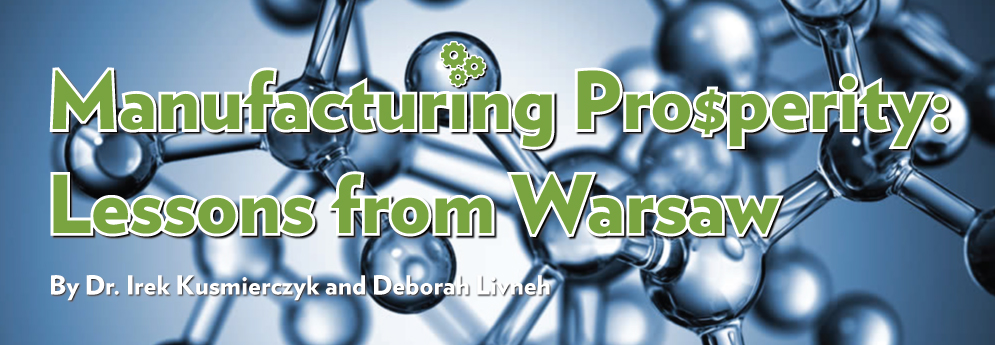By Dr. Irek Kusmierczyk and Deborah Livneh
What a city manufactures matters to its prosperity – a lot. Look at Warsaw.
That’s Warsaw in north central Indiana – a landlocked town in the middle of cornfields with fewer people than Kingsville and yet is home to one-third of the world’s $33 billion orthopedic medical device sector, according to a report titled Warsaw, Indiana: the Orthopedics Capital of the World (2009).
If you had a hip or knee replaced, chances are the part was stamped Made in Warsaw.
That’s significant considering there were 1.1 million total hip and knee replacements in the United States in 2014. Those numbers will continue to grow as baby boomers live longer and enjoy more active lifestyles, but also because of the growing epidemic of obesity. In Canada, hip and knee replacements increased by 20 per cent in the last five years.
Employment in Warsaw is booming. Over 6500 skilled workers – half Warsaw’s population—are employed in the orthopedics industry driving down unemployment in surrounding Kosciusko County to 3.6 per cent.
The jobs are also high skilled and high wage where workers make on average $81,000 per year or double the state average.
Warsaw’s “Big Three” companies—DePuy, Zimmer and Biomet—account for over $10 billion in annual sales. They anchor a medical device cluster and supply chain that includes product development, manufacturing, packaging but also research and innovation. The average patent rate in the United States is five per 10,000 people. In Warsaw, that number is 32.
More surprising is that Warsaw enjoys few of the key building blocks of economic development that are abundant in Windsor.
Warsaw is isolated and lacks the transportation and logistical infrastructure that allows Windsor to move people and product to global markets.
It takes one hour to drive from Warsaw to the University of Notre Dame and two hours to the University of Purdue, whereas Windsor is thirty minutes away from six hospitals and six post-secondary institutions where orthopedic surgeons could train, companies could conduct clinical trials, and innovation could be hatched.
Certainly, Windsor could capitalize on its biggest strength as a machine, tool and mold cluster to manufacture knees and hips and other medical devices.
Micropulse is a medical device company founded in 1988 by tool-and-die maker Brian Emerick who started with a single CNC machine in a garage next to his farmhouse.
Today, Micropulse employs 250 people inside a 100,000 square foot facility that sees 20 per cent annual growth making implants and surgical instruments for orthopedic device companies in Warsaw.
Windsor is rich in manufacturing capacity and blessed with location, logistics, hospitals, a university and college – but we have yet to put the pieces together.
That Hotel-Dieu Grace Healthcare recently launched a cross-border life sciences hub in partnership with the Windsor Essex Economic Development Corporation is a promising start. The Orthopedic Innovation Centre in the Knee and Hip Institute at Concordia Hospital in Winnipeg is an example of the potential for economic spinoffs when hospitals partner with manufacturing companies inside a high tech testing facility.
It’s not about replacing automotive, but about building upon our strengths, putting the pieces together and diversifying.
The distance from Windsor to Warsaw is 333 kilometers.
That could be the distance from precarious to prosperous.
Dr. Irek Kusmierczyk is the Director of Partnerships and Deborah Livneh is the Entrepreneur-in-Residence at WEtech Alliance, which organized the first cross-border Hacking Health Windsor-Detroit.




